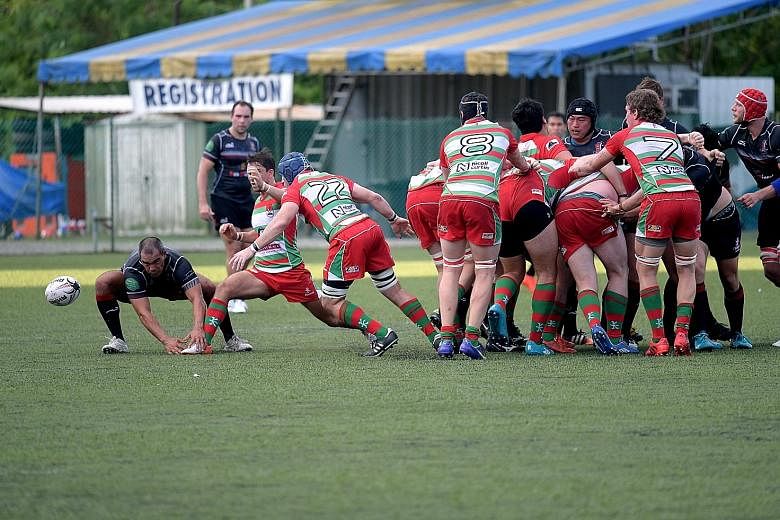The Singapore Rugby Union (SRU) is making several significant changes to the local game from next year, with the long-term aim of lifting the Republic to be among the top-four teams in Asia.
One of the key changes already introduced is national team selection - only the best players, be it citizens or expatriates who have fulfilled World Rugby residency rules, will play for the various national rugby teams.
SRU vice-president Martin Williams, who heads the national teams' commission, said: "We don't want to give anybody a free ride. We want to select the best athletes; those with the best skills, fitness and attitude to represent Singapore.
"It doesn't mean we don't want to encourage Singapore-born players, it's the other way round. We have found that sometimes a few players can rest on their laurels, they think they are guaranteed a place. We want everyone to push for a place."
In addition, from this season, only players from the four local Premiership clubs - Bucks RFC, Bedok Kings, Wanderers RFC and Singapore Cricket Club - will be considered for national selection.
Previously, players from both the top-tier Premiership and second-division Championship clubs could be called up, and there was an emphasis on picking citizens.
SRU president and former national captain Terence Khoo said: "I am almost fixated that we will select our best national team to represent our country. If you're not fit, don't have the right skills or not committed, we shouldn't pick you. It's not your right."
SRU's new selection policy is commonplace in global rugby.
Fiji-born Nathan Hughes plays for world No. 2 England's men's 15s side, having fulfilled World Rugby's three-year residency rule.
Australia, ranked fourth in the world, select players from only top-tier Super Rugby clubs.
Players and coaches The Straits Times spoke to said they understood the rationale behind SRU's move, even if some had their reservations.
Bedok Kings head coach Mark Lee said: "If you are going to pick someone from the second division and he is not exposed to the speed and physical demands of the first division, how would you expect him to jump another rung up to international rugby? It's going to be tough.
"The biggest differences between Premiership and Championship rugby here is the physicality of the game and the players' fitness levels," said the former national player, who is currently the men's 15s' assistant national coach.
National men's 15s captain Gaspar Tan also felt that choosing only Premiership players was a "valid" move, but cautioned that the local-expatriate issue needs to be dealt with delicately.
The 29-year-old hooker pointed to a 2009 incident, whereby nine local-born national players boycotted training for one-and-a-half weeks because of alleged bias towards expat players - 13 of the 30-strong team then were locals.
Tan added that the composition of locals and expats has been "about 50-50" in the last three years.
He said: "If an expat is much better than a local player, then it makes sense because in the long run, the team's standard will improve.
"As long as players are chosen on merit and everyone has an equal chance, then I think it's fair."
Wanderers' Matthew Roberts said that good communication between the technical staff and the players will mitigate any unhappiness or suspicions of bias.
"When you run out there, you represent Singapore... I am from Zimbabwe and I can never play for Zimbabwe again. I have chosen my home," said the 39-year-old, who has featured for the national team for the last seven years.
"The coaches need to justify their selections and really communicate that with the players. This past season, it was very good; the players were given feedback on which parts of their game were lacking and why another player was selected."
However, the new selection criteria will have an impact on Championship sides such as Gaulois, Saints, Oldham and Blacks.
These four Championship clubs do not have Premiership equivalents and their players will have to leave their clubs to play in the top division if they harbour aspirations to play for Singapore.
Oldham's Keith Arriola says his club, who field two teams in the second division, have been severely weakened by the departure of at least six players to Premiership sides this season.
The 26-year-old centre said: "I understand that it (the new selection policy) brings up the level of rugby, but having it as a blanket ruling is unfair and certain exceptions should be made."
He cited himself as an example.
After suffering a dislocated knee cap and torn medial collateral ligament from a Championship match earlier this year, he chose to stay with Oldham because he was still on the mend.
He said: "When the selectors come in some time next year, I will be fully fit but have no chance."
He added that the intensity of Championship rugby is similar to that of the Premiership.
"I played for the Wanderers three or four years ago and when I joined Oldham in the Championship, it was still really tough," said Arriola, who has two caps with the national 15s team and last turned out for the national sevens side in 2014.
"The Premiership rugby is faster and the contact is much harder, but I think it's manageable, especially if you have been performing at Championship level.
"There is a difference but for me, it was not that different."
Raft of changes
NATIONAL TEAMS SELECTION
• Only players from the Premiership, the top domestic competition, will be considered.
• Athletes must have played at least 50 per cent of their team's games.
• Citizens and those expatriates who have fulfilled the minimum three-year residency period will be considered equally.
YOUTH DEVELOPMENT
• National curriculum to be introduced, with standardised rules for various age-group tournaments. The syllabus will also instruct coaches on the type of skills and intensity of training to be imparted at different age groups.
• National curriculum to also be used to persuade schools to take up rugby as a CCA.
• Rugby is currently offered in 19 primary schools, 16 secondary schools and 16 tertiary institutions. The SRU aims to increase this to 40 primary schools and 20 secondary schools.
• SRU to facilitate discussions between senior (Premiership and Championship) clubs with junior clubs and schools, with the hope of the clubs and schools forming formal relationships to strengthen the development pathway of an athlete and to mitigate attrition.
ECO-SYSTEM
• Coaches to go through upgrading; registry of coaches to be set up.
• Higher quality grassroots events to be held at SRU and club levels, which will generate more revenue and value for both the union and the clubs.
• Marketing: Higher quality outreach efforts to all stakeholders such as national athletes, schools, clubs and sponsors.
• Domestic competitions: To deconflict club and school competitions by reducing overlap of the competitions, allowing athletes more opportunities to play rugby.


